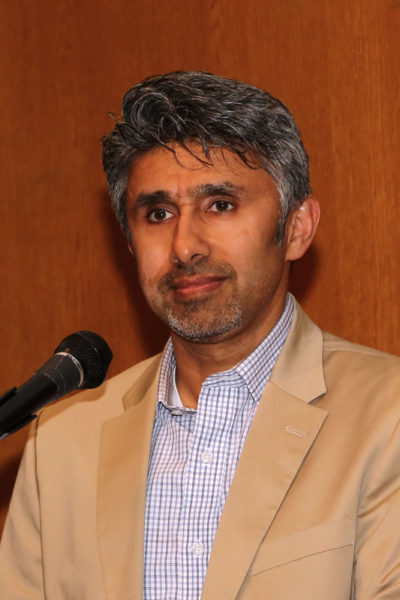For many years, members of metropolitan Detroit’s Jewish and Muslim communities have been working together to create closer bonds.
In 2013, two organizations seeking to deepen these ties, the Detroit regional office of the American Jewish Committee (AJC) and Michigan Muslim Community Council (MMCC), decided to examine the attitudes and experiences of members of both communities through a survey formulated and conducted by the University of Michigan-Dearborn i-Labs.

Spearheaded by then AJC Detroit President Bryant Frank and then MMCC Chair Dr. Muzammil Ahmed, and funded with support from the Ravitz Foundation, the study reported similarities between the two communities, with responders indicating their respective degrees of willingness to interact.
To publicize the results, AJC and MMCC hosted a public program where each organization provided commentary on the survey. The event further featured a series of interactive workshops with paired presenters from each community, each addressing a specific topic.
Among the program’s presenters were Wayne State University Professors Howard Lupovitch and Saeed Khan.

At that time, the now infamous duo hardly knew one another. Still, interest in their lecture was so substantial that it was moved to the concluding plenary event of the program so that everyone could attend.
“They were so similar and their level of intelligence, respectful disagreement and ability to have really challenging conversations framed in history was astounding,” said Kari Alterman, regional director of AJC Detroit at that time. “Recognizing potential in the present and the future, their narratives were remarkable, leaving everyone inspired and informed.”
Added Frank with a smile, “I’m proud to say that we made that shidduch.”

Following the inaugural event, positive reviews of the three-part lecture series, “A Shared Future,” was created.
The annual program continues to explore topics of importance to the local Jewish and Muslim communities. Each year, the lectures take place at three different venues: a Muslim-affiliated location, a synagogue and Wayne State University. Significantly, attendance at each venue includes Jews and Muslims.
Expounds Dr. Ahmed, “A Shared Future was created in the spirit of exploring the commonalities of our communities. The Jewish and Muslim communities have a lot of shared history that needs to be celebrated. We also have a lot of common challenges facing us in this country. We are fortunate to have two highly experienced academics discuss seriously deep, and often controversial, issues in ways that actually show how we can work together to create a better future.”
This year, the series is entitled, “Are We Religiously Free in America?” On Wednesday, February 12, the Muslim Unity Center will host the first installment, which will explore the navigation and implementation of Halacha and Sharia in the United States. On the following Wednesday, February 19, at Congregation Beth Ahm in West Bloomfield, Professors Khan and Lupovitch will discuss attitudes and applications of separation of religion and state. Finally, Wayne State University will play host on Wednesday, February 26 as the program culminates with attitudes toward the First Amendment as they pertain to constructive debate and civil discourse.

“A Shared Future has helped to establish a more in-depth, personal relationship between the two communities, but there remains much to be accomplished,” said Frank, who now serves on the board of the Jewish Community Relations Council/AJC, which was created in 2016 following AJC Detroit’s partnership with the Jewish Community Relations Council of Metropolitan Detroit.
“Trust continues to be the unique currency of this endeavor and trust results from time spent and patience proffered in abundance. There simply is no shortcut to the creation of trust and I am proud of the relationships created by these long-term efforts.”
All three programs begin at 7 p.m. and are followed by a dessert reception. There is no cost to attend but registration is required. It can be completed at https://sharedfuturereligiousfreedom.eventbrite.com.
.



